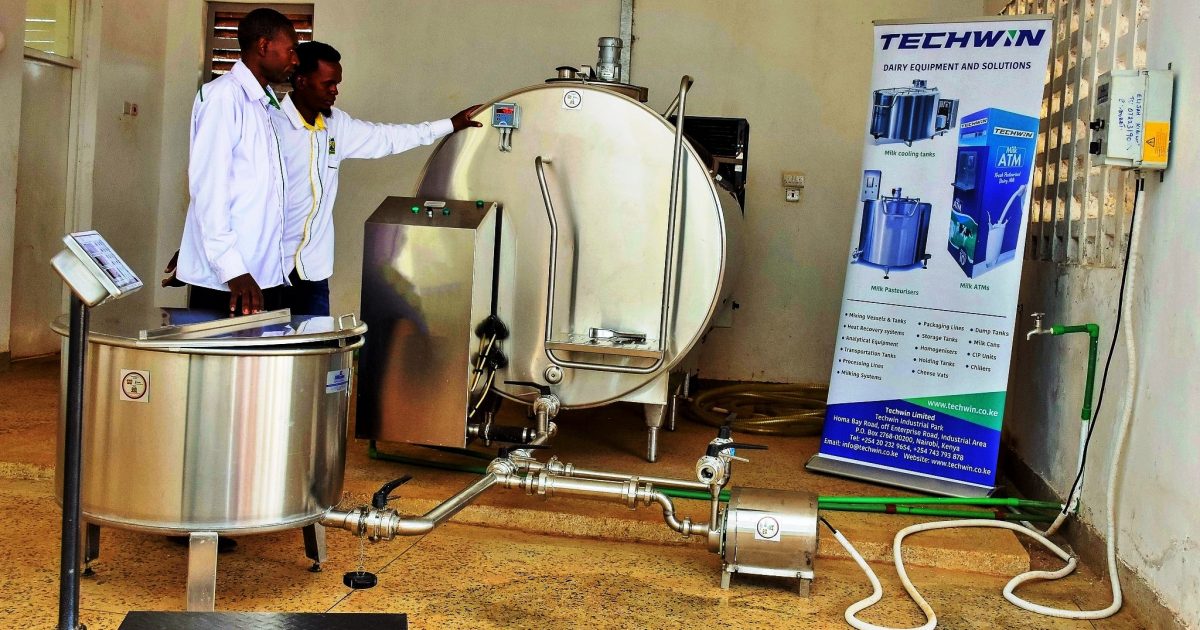Milk is a nutrient-rich white fluid produced by the mammary glands of mammals to nourish their young ones. It contains essential nutrients that include calcium, protein, and vitamins.
Milk is positioned as Kenya’s fourth most valuable agricultural product, after tea, horticulture, and cattle trade, supporting the livelihoods of over two million small-scale rural dairy farmers.
Data from the State Department of Livestock shows that Kenya produces an annual output of up to 5.7 billion litres, which represents 10 per cent of Africa’s and 35 per cent of the East African Community’s total milk supply.
The current per capita milk consumption is estimated at 110 litres, which is projected to double to 220 litres by 2030.
More data from the Ministry of Livestock Development shows that in 2024, Kenyan milk processing (value addition) reached a historic high of 908.4 million litres, marking the highest single-year quantity since 2001. This is a 12.04 percent increase from 2023 where milk processing was 810.8 million litres processed in 2023.
This is attributable to improved weather and a focus on boosting the dairy sector. The Government has outlined plans to double milk production to 10 billion litres annually with the aim of boosting incomes for small-scale dairy farmers.
The Dairy Industry Bill, 2024, which is currently before Parliament aims to regulate and promote the dairy industry in order to reduce milk loss, improve safety and quality of dairy products.
Currently, the sector’s processing capacity has increased, but only 45 percent of this capacity is currently utilized, indicating potential for further growth.
However, the rising costs of livestock feeds, access to finance, and climate change have been identified as some of challenges facing dairy production not only in Kenya, but also in the East African region.
In Naivasha, one Organization is assisting the smallholder farmers not only in reducing milk loss, but also in improving safety and quality of dairy products and also value addition in order to maximize returns from their milk.
Techwin Limited was founded in 2007 as a dairy equipment supplier. Initially, equipment was imported from Greece, but local manufacture was started six years ago.
The entity manufactures milking machines, milk tanks, pasteurization units, milk coolers, UHT milk machines (that is, machines that add value to milk by processing the milk under Ultra-High Temperature (UHT) where it is heated to a very high temperature of at least 135° Centigrade in order to preserve it for a long time for future use.
They also manufacture “milk ATMs” which are vending machines that dispense fresh, pasteurized milk, thus allowing customers to purchase milk in small quantities at any time and value-addition machines for production of cheese, butter, yoghurt and sour milk among other milk products.
Their machines are certified by Kenya Bureau of Standards (KEBS) and the Company is working on patenting their innovations.
Techwin Limited Marketing Coordinator, Ms. Queen Lombaka, says most dairy farmers in Kenya are smallholder, earning low prices for their milk and that is why her organization came in to develop smaller equipment of 50 to 500 litre capacity equipment for cooperatives and smallholder farmers and pasteurization and cooling solutions to reduce milk spoilage, considering that milk is a highly perishable product.
Other innovations they have come-up with to reduce costs for farmers include, biogas, steam, and Liquefied Petroleum Gas (LPG) powered pasteurization units to cut electricity costs and solar-powered cooling solutions (milk coolers and cold rooms) for off-grid areas.
Ms. Lombaka says the Company has installed solar-powered cooling stations in rural counties such as Wajir, Mandera, Garissa, Tana River, and Narok (in Maasai Mara area).
She, however, says some of the challenges facing dairy farmers reducing their productivity include post-harvest milk losses, where hundreds of litres of milk get spoilt.
This is because many farmers are located in remote areas, far from milk collection centres and without proper cooling or storage facilities, thus they are forced to sell their milk quickly at low prices or risk losing it entirely.
To solve this problem, Techwin Limited has introduced small-scale pasteurization and cooling units that could be powered by biogas, solar, steam, or LPG gas to help farmers preserve their milk for longer, reducing wastage and giving them more time to find better buyers.
The high cost of electricity costs in milk processing has also seen many dairy cooperatives struggle to keep their cooling and pasteurization units running, especially during dry seasons when milk production is low. This often forces them to shut down, leading to lost income for farmers.
To this end, Techwin Limited has developed energy-efficient alternatives, including biogas-powered pasteurizers, LPG and steam-powered boilers, and solar-powered cooling units.
These innovations help farmers reduce their dependency on expensive electricity, making dairy processing more sustainable and profitable.
During periods of high milk production, farmers are often forced to sell their milk at very low prices because they lack storage options. Large processors take advantage of this situation, offering farmers minimal compensation for their hard work.
The Organization has, therefore, come-up with affordable cooling and storage solutions, to help farmers to store their milk for longer periods, giving them the flexibility to negotiate better prices or wait for demand to increase. This prevents them from selling their milk at throwaway prices.
Maintaining milk hygiene is also a major challenge, especially for small-scale farmers who may not have access to high-quality equipment. This poor hygiene leads to contamination, spoilage, and rejection by processors, resulting in financial losses.
Accordingly, Techwin Limited is manufacturing high-quality, food-grade stainless steel equipment that is easy to clean and maintain. By training farmers on hygiene-best practices and supplying them with proper equipment, the Company ensures that milk meets market quality standards.
Many smallholder farmers and dairy cooperatives also struggle to afford modern dairy processing equipment due to the high costs of these equipment. Thereby. limiting their ability to add value to their milk and earn better profits.
To solve this problem, Techwin Limited has introduced flexible pricing models, including pay-as-you-go systems, where farmers pay in instalments.
They have also introduced staged installations which allow cooperatives to start small and expand as they earn money and partnerships with Non-Governmental Organizations (NGOs) and financial institutions, to help subsidize costs for smallholder farmers and cooperatives.
Techwin limited has also come-up with flexible payment plans with financial institutions to finance the purchase of equipment by farmers and installations are done in stages so farmers can start small and expand.
The Company also provides training for farmers and cooperatives on using and maintaining equipment, improving hygiene standards and reducing operational costs and losses and also participate in events to engage with farmers and learning institutions, to understand farmers’ needs and improve equipment.
Thus, Techwin is committed to supporting smallholder farmers by providing affordable, energy-efficient, high-quality dairy equipment. Their innovations, flexible pricing, and training programs help farmers increase profits, reduce losses, and improve milk hygiene.
As of 2017 data, the country’s animal population comprised 44.6 million poultry, 18.8 million cattle, 26.7 million goats, 18.9 million sheep, 3.2 million camels, 1.9 million donkeys, and 0.5 million pigs, which contributed 4,4 per cent of the Gross Domestic Product (GDP) same year.
According to FAO, Kenya’s beef production stands at 588,000 metric tonnes and cow milk production at 4.1 billion litres per year, and the demand for livestock products is projected to increase exponentially driven by population growth by the year 2050.
The study titled; Future of Livestock in Kenya 2019 shows that by the year 2050, meat and cow milk consumption will increase by 1.4 and 6.6 million metric tons annually respectively.
By Mabel Keya – Shikuku





